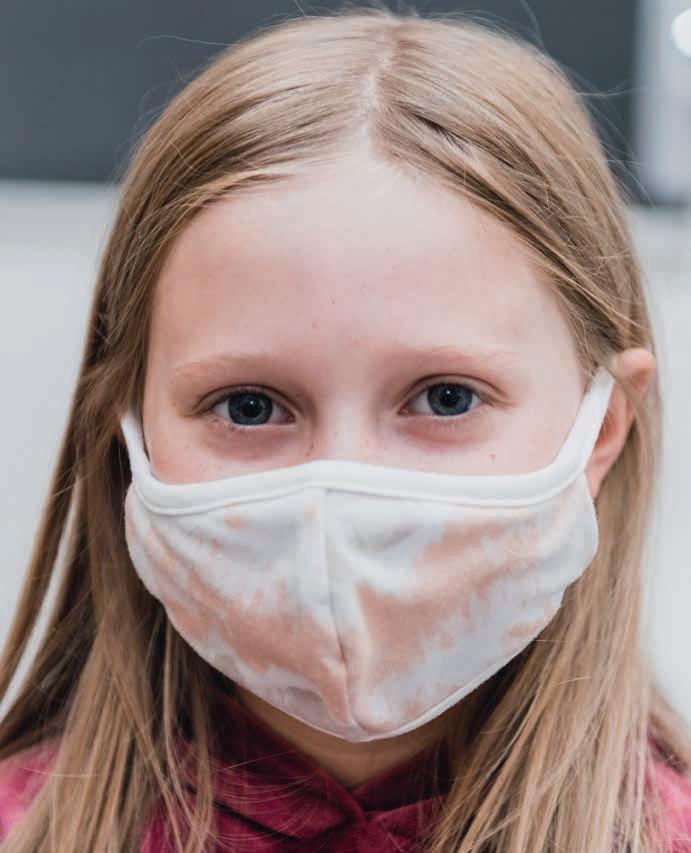DIGESTIVE DISEASES, HEPATOLOGY & NUTRITION The Division of Digestive Diseases, Hepatology, and Nutrition is committed to cutting edge and innovative clinical care of infants, children and adolescents; pioneering clinical, translational, and basic research; and the education of the next generation of physicians. In 2020, the division was challenged by the unprecedented SARS-CoV-2 pandemic to continue to meet its lofty standard of excellence in clinical care, research, and education. Through the efforts of a dedicated and talented staff, we met these standards. By quickly pivoting to telemedicine in March, our clinicians continued to serve the needs of the children of Connecticut and the surrounding states. Over the ensuing months, we flexed back to a mixture of in-person and televisits. Our tradition of educating students, residents, and fellows continued through increasing reliance on Zoom meetings. Clinical trials initially stopped but were resumed by early fall. Given the increasingly large number of clinicians and our seven active care sites, we appointed Bella Zeisler, MD, as medical director of the Greater Hartford campus activities, and Donna Zeiter, MD, as medical director of our South Hadley, MA, program. Division chief Jeffrey Hyams, MD, continues to oversee the Fairfield County program. Our Center for Pediatric Inflammatory Bowel Disease (IBD), the largest program in the region between Boston and New York, continues to provide care to over 800 children with Crohn’s disease and ulcerative colitis. Pioneering research at Connecticut Children’s and its collaborating institutions funded by the National Institutes of Health (NIH) and the Crohn’s & Colitis Foundation unravels some of the mysteries underlying the genesis of bowel inflammation and provides tools to utilize precision medicine in its treatment. Dr. Hyams, holder of the Mandell Braunstein Family Endowed Chair in Pediatric Inflammatory Bowel Disease, completed work on a five-year, $10.4 million NIH-funded project developing predictors of disease course in children with 56
ANNUAL ACADEMIC REPORT 2020
ulcerative colitis, and, in collaboration with pre-eminent IBD investigators throughout North America, submitted a potentially groundbreaking new initiative to the NIH. Partnering with the division of Infectious Diseases at Connecticut Children’s and with the Jackson Laboratory (JAX) in Farmington, CT, Dr. Hyams and research staff began examining the immune response of patients with IBD to SARS-CoV-2. Our Center for Pediatric Liver Care, directed by Karan Emerick, MD, continues its excellent work in providing care to children with hepatic disorders ranging from chronic hepatitis B and C, metabolic liver disease, autoimmune disease, and acute and chronic liver failure. It provides preand post-transplant care to 40 children. Samantha Lee, APRN, under the guidance of Dr. Emerick, coordinates the program caring for children with non-alcoholic fatty liver disease (NAFLD) and works closely with other divisions in the hospital. Fibroscan® technology, started a year ago, now allows the non-invasive evaluation of liver fibrosis in children with chronic liver disorders. Dr. Emerick serves as an attending physician on the hepatic transplant service at Yale New Haven Hospital six to eight weeks yearly. Our Multidisciplinary Intestinal Rehabilitation Team (MIRT) is the only one of its kind in the state. Co-directed by Jasmeet Mokha, MD, and Christine Rader, MD, from Pediatric Surgery, this group focuses on the care of children with intestinal failure of all causes. Phyllis Bebyn, RN, and Kate Samela, RD, are integral parts of this team, which also facilitates the transition of patients from hospital to home. Corey Baker, MD, who joined our faculty a year ago, has ably developed our Center for Neurogastroenterology program and has established anorectal manometry and esophageal motility capability. Dr. Baker, along with Victoria Grossi, DO, and Dr. Zeisler, serve as the gastroenterologists in the Aerodigestive Disease Program. This coordinated program of otolaryngologists, pulmonologists, gastroenterologists, and speech therapists cares for children with complex airway, pulmonary and gastrointestinal disorders. The medical education team within our department includes Drs. Zeisler, Mokha, Melissa Fernandes, Pete
Townsend, and Katherine Baldwin. Dr. Zeisler remains the fellowship program director, with Dr. Fernandes the associate program director. Dr. Baldwin is responsible for organizing the fellowship didactics curriculum. Drs. Zeisler and Townsend are the GI clinical faculty leads for the residency. Dr. Fernandes is the GI lead for University of Connecticut medical students rotating through inpatient and outpatient service. Dr. Mokha is in charge of the Quinnipiac University medical students who rotate through the GI outpatient clinic. All GI faculty remain engaged in teaching different learners as they rotate through the various GI clinical opportunities. The great depth in our pediatric surgical and radiology programs as well as the great variety of clinical disorders and the intimate involvement of our faculty make our educational programs particularly attractive. Logan Jerger, MD, has been appointed as the division’s quality improvement officer. Dr. Townsend has been appointed our medical director of endoscopy. Under the leadership of Dr. Zeiter, and supported by Sarita Singhal, MD, our South Hadley campus was the first in that region to provide full telehealth capabilities for pediatric subspecialists. In September 2020, the GI practice welcomed a large influx of patients from another pediatric GI practice that had closed permanently. The Connecticut Children’s practice is well-positioned to provide personal, safe, and accessible gastroenterology care to the children of western Massachusetts, southern Vermont, and New York state. Brad Jerson, PhD, our division’s pediatric psychologist, provides fully embedded psychological evaluation and intervention services. He has partnered with other institutional departments and regional community mental health agencies for development of psychosocial programming to address GI symptoms from an evidence-based perspective. Specifically, he has partnered with the Division of Pain and Palliative Medicine to implement “Comfort Ability,” a full-day skills-building workshop for adolescents and their parents for coping with chronic pain. Additionally, he has presented at national and regional conferences and workshops about the importance of conceptualizing GI conditions from a biopsychosocial perspective.














































